International Financial Reporting: Impact on Financial Statements
VerifiedAdded on 2021/04/21
|42
|11365
|36
Report
AI Summary
This report investigates the impact of International Financial Reporting Standards (IFRS) on the construction and presentation of financial statements. It begins with an introduction to the background of IFRS, discussing the evolution of accounting standards and the increasing need for a common global reporting language. The report explores the problem statement, research aims, objectives, and questions, along with a discussion of the research gap. A comprehensive literature review examines the meaning of IFRS, its adoption globally, its role in capital markets, and its relevance in emerging markets. The methodology section details the research philosophy, approach, design, data sources (secondary data), and data analysis plan. The data analysis and discussion chapter focuses on accounting standards, accounting quality, decision usefulness, and positive accounting theory. The report concludes with a summary of findings, recommendations, and suggestions for future research, emphasizing the interconnectedness of IFRS and financial statement preparation for companies worldwide. The report uses secondary data to analyze and assess the impact of IFRS on the quality and comparability of financial reporting, and the challenges and benefits of IFRS adoption.
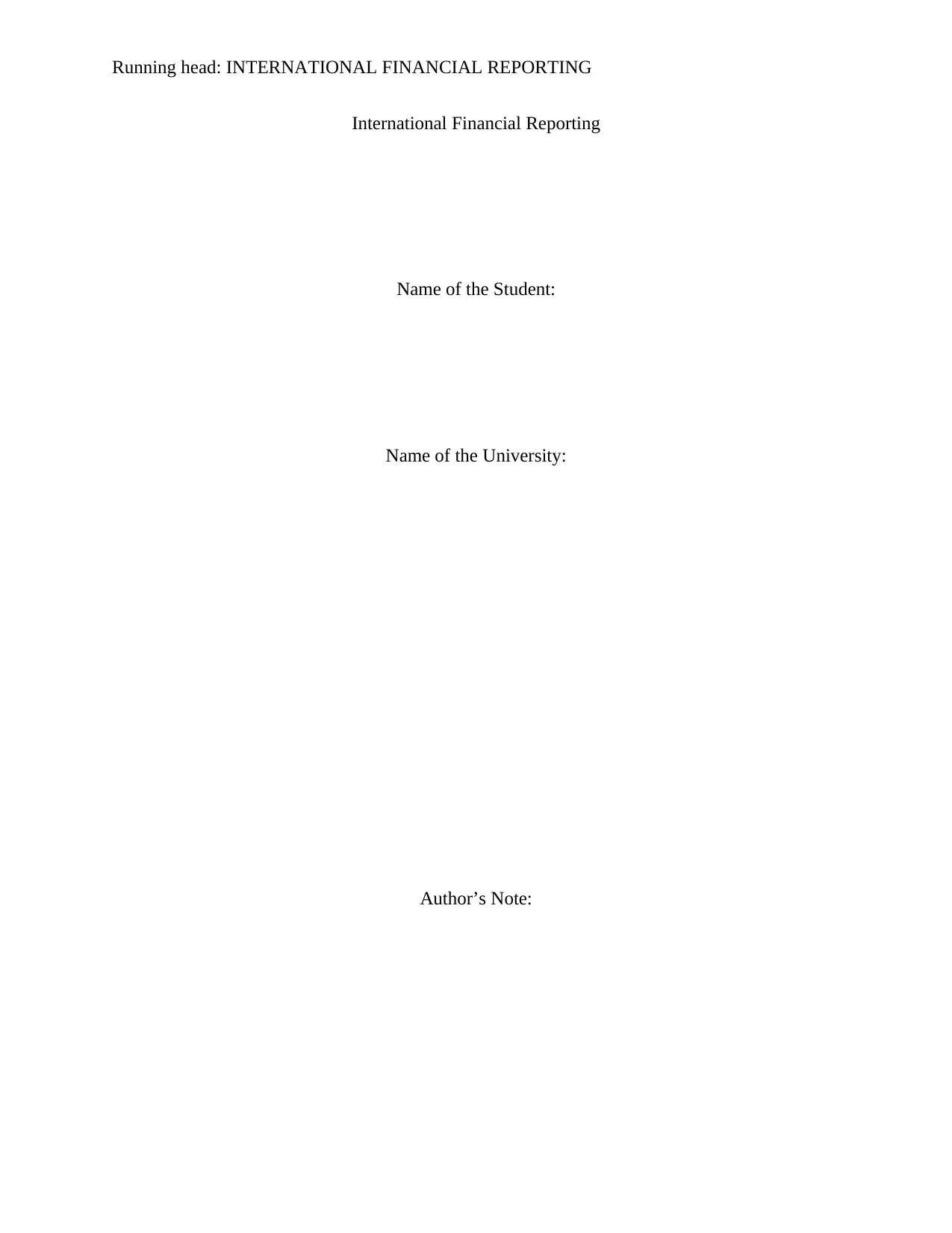
Running head: INTERNATIONAL FINANCIAL REPORTING
International Financial Reporting
Name of the Student:
Name of the University:
Author’s Note:
International Financial Reporting
Name of the Student:
Name of the University:
Author’s Note:
Paraphrase This Document
Need a fresh take? Get an instant paraphrase of this document with our AI Paraphraser
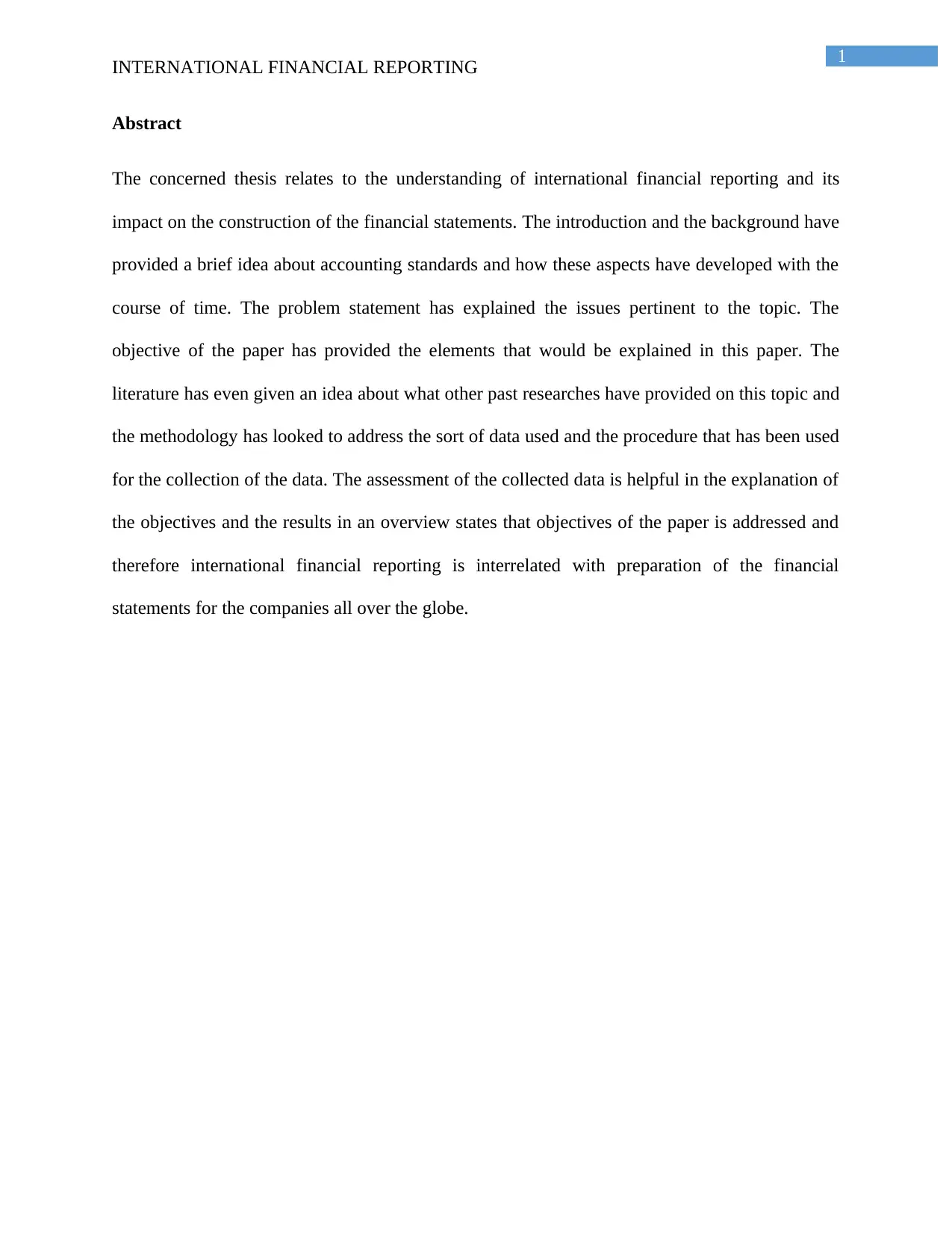
1
INTERNATIONAL FINANCIAL REPORTING
Abstract
The concerned thesis relates to the understanding of international financial reporting and its
impact on the construction of the financial statements. The introduction and the background have
provided a brief idea about accounting standards and how these aspects have developed with the
course of time. The problem statement has explained the issues pertinent to the topic. The
objective of the paper has provided the elements that would be explained in this paper. The
literature has even given an idea about what other past researches have provided on this topic and
the methodology has looked to address the sort of data used and the procedure that has been used
for the collection of the data. The assessment of the collected data is helpful in the explanation of
the objectives and the results in an overview states that objectives of the paper is addressed and
therefore international financial reporting is interrelated with preparation of the financial
statements for the companies all over the globe.
INTERNATIONAL FINANCIAL REPORTING
Abstract
The concerned thesis relates to the understanding of international financial reporting and its
impact on the construction of the financial statements. The introduction and the background have
provided a brief idea about accounting standards and how these aspects have developed with the
course of time. The problem statement has explained the issues pertinent to the topic. The
objective of the paper has provided the elements that would be explained in this paper. The
literature has even given an idea about what other past researches have provided on this topic and
the methodology has looked to address the sort of data used and the procedure that has been used
for the collection of the data. The assessment of the collected data is helpful in the explanation of
the objectives and the results in an overview states that objectives of the paper is addressed and
therefore international financial reporting is interrelated with preparation of the financial
statements for the companies all over the globe.
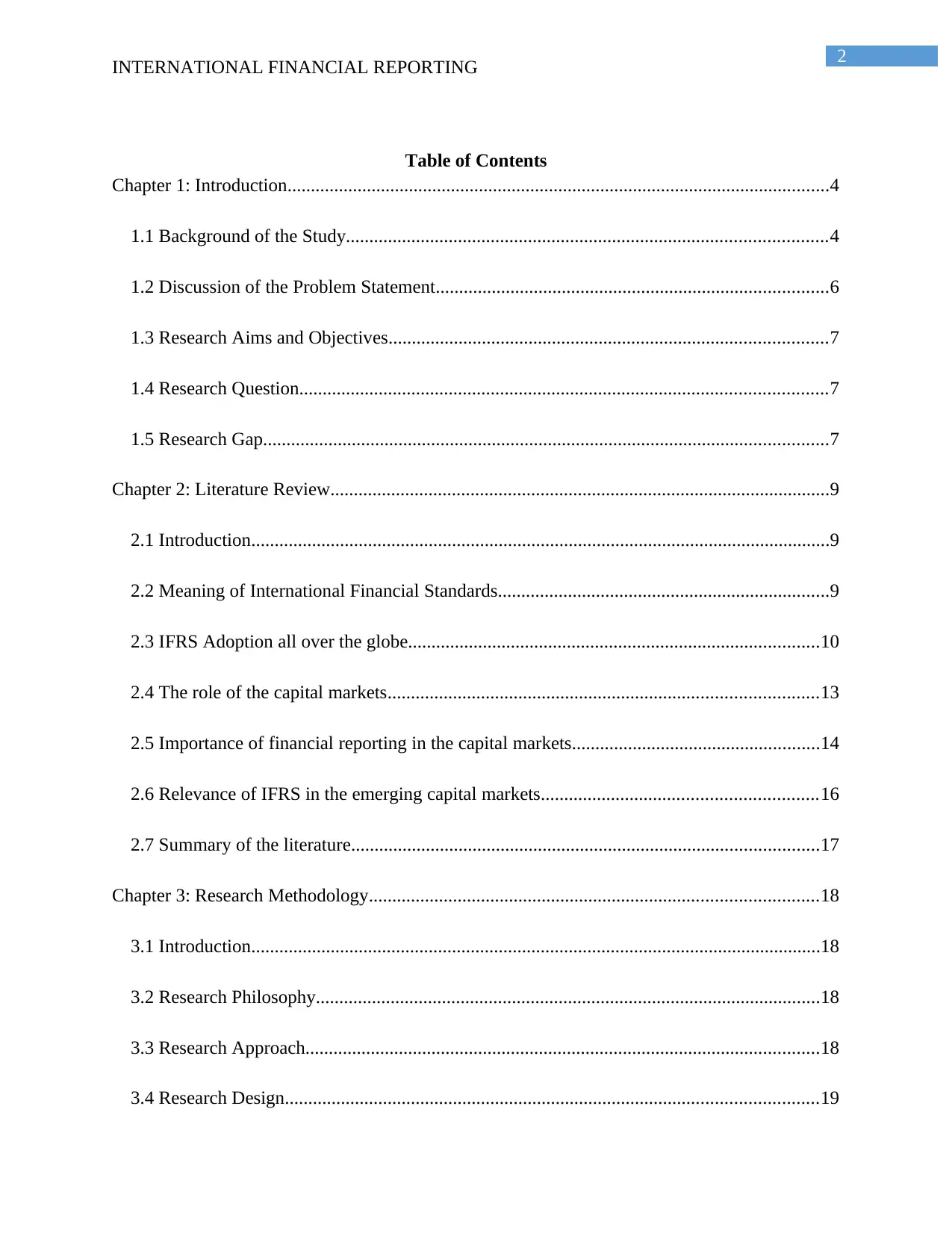
2
INTERNATIONAL FINANCIAL REPORTING
Table of Contents
Chapter 1: Introduction....................................................................................................................4
1.1 Background of the Study.......................................................................................................4
1.2 Discussion of the Problem Statement....................................................................................6
1.3 Research Aims and Objectives..............................................................................................7
1.4 Research Question.................................................................................................................7
1.5 Research Gap.........................................................................................................................7
Chapter 2: Literature Review...........................................................................................................9
2.1 Introduction............................................................................................................................9
2.2 Meaning of International Financial Standards.......................................................................9
2.3 IFRS Adoption all over the globe........................................................................................10
2.4 The role of the capital markets............................................................................................13
2.5 Importance of financial reporting in the capital markets.....................................................14
2.6 Relevance of IFRS in the emerging capital markets...........................................................16
2.7 Summary of the literature....................................................................................................17
Chapter 3: Research Methodology................................................................................................18
3.1 Introduction..........................................................................................................................18
3.2 Research Philosophy............................................................................................................18
3.3 Research Approach..............................................................................................................18
3.4 Research Design..................................................................................................................19
INTERNATIONAL FINANCIAL REPORTING
Table of Contents
Chapter 1: Introduction....................................................................................................................4
1.1 Background of the Study.......................................................................................................4
1.2 Discussion of the Problem Statement....................................................................................6
1.3 Research Aims and Objectives..............................................................................................7
1.4 Research Question.................................................................................................................7
1.5 Research Gap.........................................................................................................................7
Chapter 2: Literature Review...........................................................................................................9
2.1 Introduction............................................................................................................................9
2.2 Meaning of International Financial Standards.......................................................................9
2.3 IFRS Adoption all over the globe........................................................................................10
2.4 The role of the capital markets............................................................................................13
2.5 Importance of financial reporting in the capital markets.....................................................14
2.6 Relevance of IFRS in the emerging capital markets...........................................................16
2.7 Summary of the literature....................................................................................................17
Chapter 3: Research Methodology................................................................................................18
3.1 Introduction..........................................................................................................................18
3.2 Research Philosophy............................................................................................................18
3.3 Research Approach..............................................................................................................18
3.4 Research Design..................................................................................................................19
⊘ This is a preview!⊘
Do you want full access?
Subscribe today to unlock all pages.

Trusted by 1+ million students worldwide
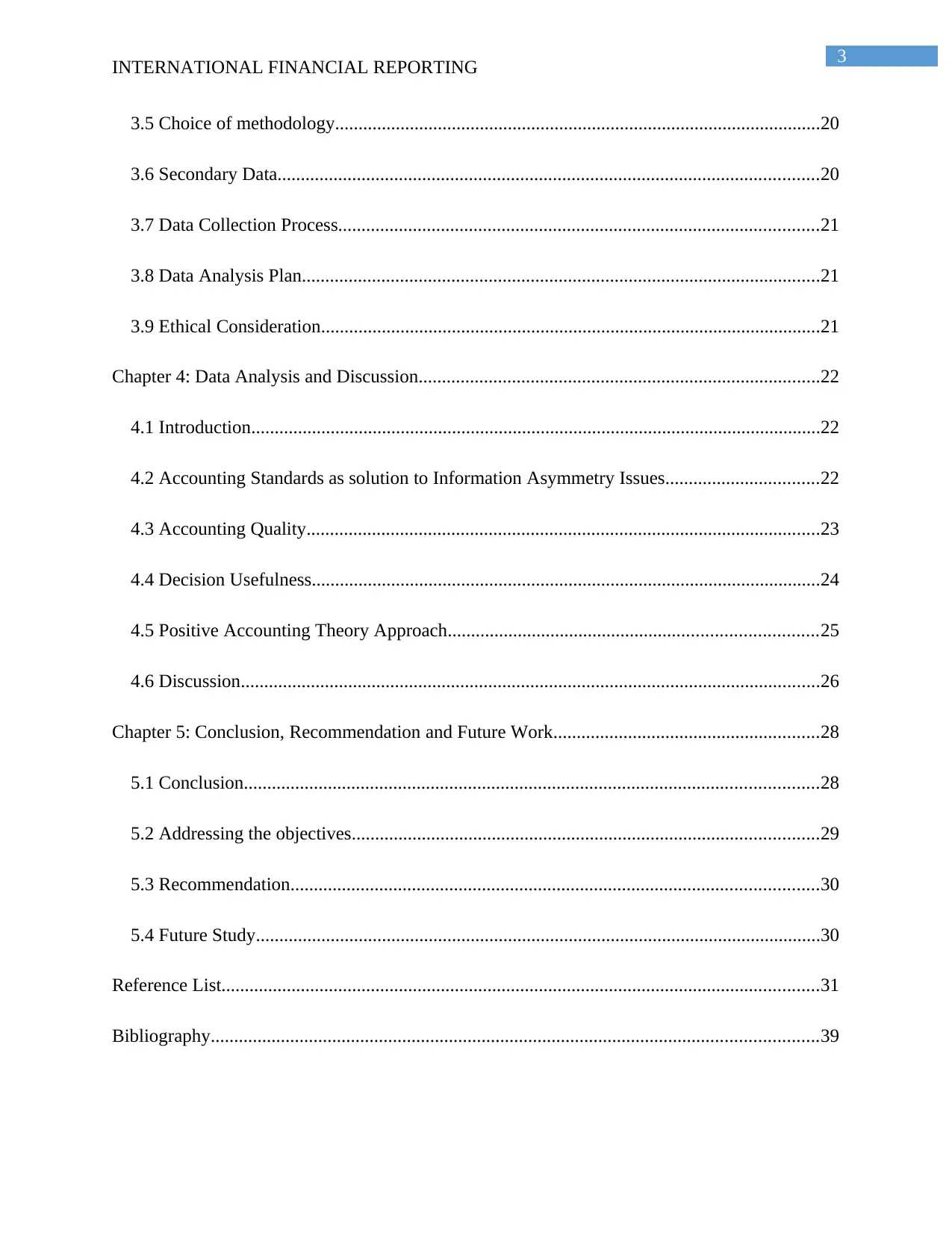
3
INTERNATIONAL FINANCIAL REPORTING
3.5 Choice of methodology........................................................................................................20
3.6 Secondary Data....................................................................................................................20
3.7 Data Collection Process.......................................................................................................21
3.8 Data Analysis Plan...............................................................................................................21
3.9 Ethical Consideration...........................................................................................................21
Chapter 4: Data Analysis and Discussion......................................................................................22
4.1 Introduction..........................................................................................................................22
4.2 Accounting Standards as solution to Information Asymmetry Issues.................................22
4.3 Accounting Quality..............................................................................................................23
4.4 Decision Usefulness.............................................................................................................24
4.5 Positive Accounting Theory Approach...............................................................................25
4.6 Discussion............................................................................................................................26
Chapter 5: Conclusion, Recommendation and Future Work.........................................................28
5.1 Conclusion...........................................................................................................................28
5.2 Addressing the objectives....................................................................................................29
5.3 Recommendation.................................................................................................................30
5.4 Future Study.........................................................................................................................30
Reference List................................................................................................................................31
Bibliography..................................................................................................................................39
INTERNATIONAL FINANCIAL REPORTING
3.5 Choice of methodology........................................................................................................20
3.6 Secondary Data....................................................................................................................20
3.7 Data Collection Process.......................................................................................................21
3.8 Data Analysis Plan...............................................................................................................21
3.9 Ethical Consideration...........................................................................................................21
Chapter 4: Data Analysis and Discussion......................................................................................22
4.1 Introduction..........................................................................................................................22
4.2 Accounting Standards as solution to Information Asymmetry Issues.................................22
4.3 Accounting Quality..............................................................................................................23
4.4 Decision Usefulness.............................................................................................................24
4.5 Positive Accounting Theory Approach...............................................................................25
4.6 Discussion............................................................................................................................26
Chapter 5: Conclusion, Recommendation and Future Work.........................................................28
5.1 Conclusion...........................................................................................................................28
5.2 Addressing the objectives....................................................................................................29
5.3 Recommendation.................................................................................................................30
5.4 Future Study.........................................................................................................................30
Reference List................................................................................................................................31
Bibliography..................................................................................................................................39
Paraphrase This Document
Need a fresh take? Get an instant paraphrase of this document with our AI Paraphraser
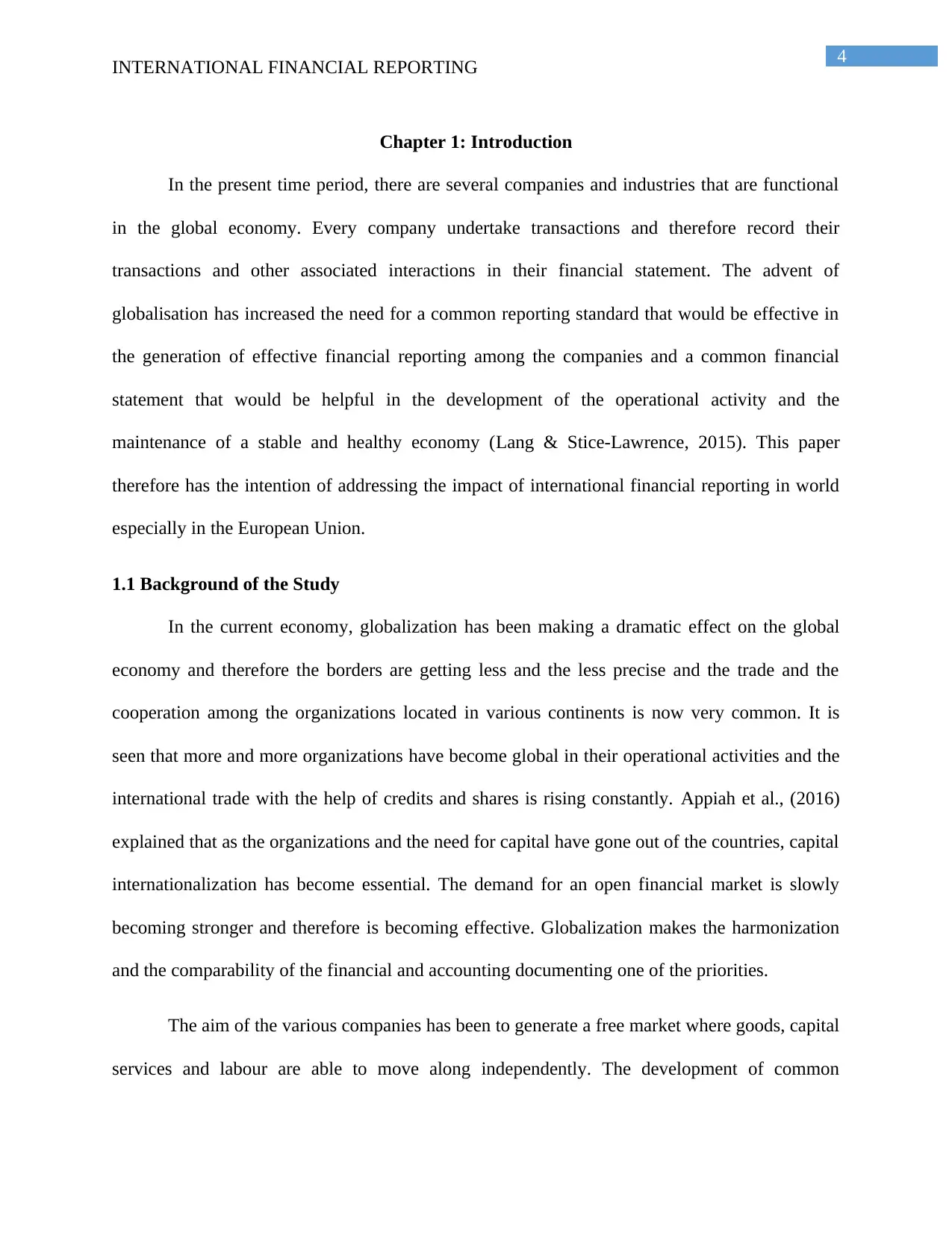
4
INTERNATIONAL FINANCIAL REPORTING
Chapter 1: Introduction
In the present time period, there are several companies and industries that are functional
in the global economy. Every company undertake transactions and therefore record their
transactions and other associated interactions in their financial statement. The advent of
globalisation has increased the need for a common reporting standard that would be effective in
the generation of effective financial reporting among the companies and a common financial
statement that would be helpful in the development of the operational activity and the
maintenance of a stable and healthy economy (Lang & Stice-Lawrence, 2015). This paper
therefore has the intention of addressing the impact of international financial reporting in world
especially in the European Union.
1.1 Background of the Study
In the current economy, globalization has been making a dramatic effect on the global
economy and therefore the borders are getting less and the less precise and the trade and the
cooperation among the organizations located in various continents is now very common. It is
seen that more and more organizations have become global in their operational activities and the
international trade with the help of credits and shares is rising constantly. Appiah et al., (2016)
explained that as the organizations and the need for capital have gone out of the countries, capital
internationalization has become essential. The demand for an open financial market is slowly
becoming stronger and therefore is becoming effective. Globalization makes the harmonization
and the comparability of the financial and accounting documenting one of the priorities.
The aim of the various companies has been to generate a free market where goods, capital
services and labour are able to move along independently. The development of common
INTERNATIONAL FINANCIAL REPORTING
Chapter 1: Introduction
In the present time period, there are several companies and industries that are functional
in the global economy. Every company undertake transactions and therefore record their
transactions and other associated interactions in their financial statement. The advent of
globalisation has increased the need for a common reporting standard that would be effective in
the generation of effective financial reporting among the companies and a common financial
statement that would be helpful in the development of the operational activity and the
maintenance of a stable and healthy economy (Lang & Stice-Lawrence, 2015). This paper
therefore has the intention of addressing the impact of international financial reporting in world
especially in the European Union.
1.1 Background of the Study
In the current economy, globalization has been making a dramatic effect on the global
economy and therefore the borders are getting less and the less precise and the trade and the
cooperation among the organizations located in various continents is now very common. It is
seen that more and more organizations have become global in their operational activities and the
international trade with the help of credits and shares is rising constantly. Appiah et al., (2016)
explained that as the organizations and the need for capital have gone out of the countries, capital
internationalization has become essential. The demand for an open financial market is slowly
becoming stronger and therefore is becoming effective. Globalization makes the harmonization
and the comparability of the financial and accounting documenting one of the priorities.
The aim of the various companies has been to generate a free market where goods, capital
services and labour are able to move along independently. The development of common
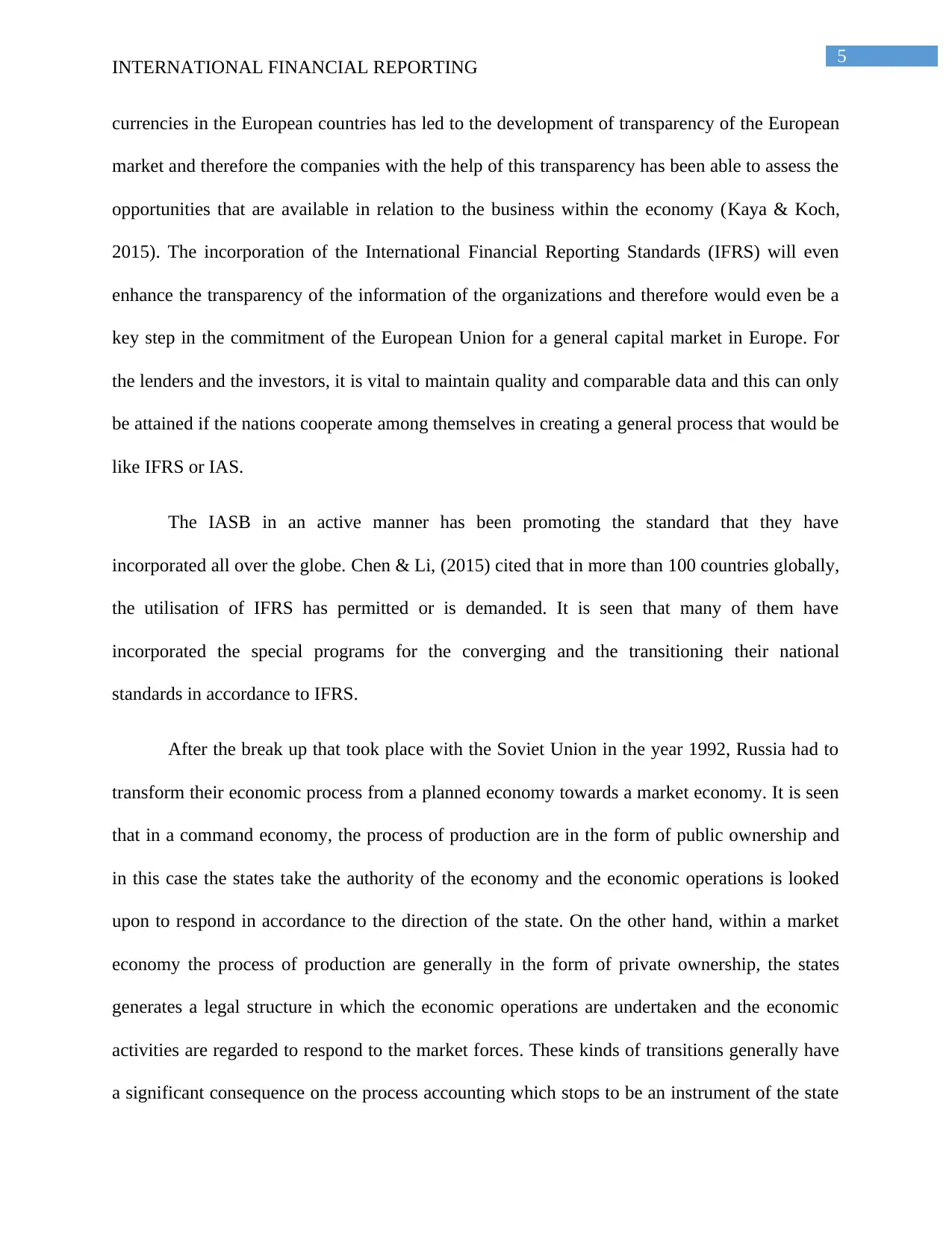
5
INTERNATIONAL FINANCIAL REPORTING
currencies in the European countries has led to the development of transparency of the European
market and therefore the companies with the help of this transparency has been able to assess the
opportunities that are available in relation to the business within the economy (Kaya & Koch,
2015). The incorporation of the International Financial Reporting Standards (IFRS) will even
enhance the transparency of the information of the organizations and therefore would even be a
key step in the commitment of the European Union for a general capital market in Europe. For
the lenders and the investors, it is vital to maintain quality and comparable data and this can only
be attained if the nations cooperate among themselves in creating a general process that would be
like IFRS or IAS.
The IASB in an active manner has been promoting the standard that they have
incorporated all over the globe. Chen & Li, (2015) cited that in more than 100 countries globally,
the utilisation of IFRS has permitted or is demanded. It is seen that many of them have
incorporated the special programs for the converging and the transitioning their national
standards in accordance to IFRS.
After the break up that took place with the Soviet Union in the year 1992, Russia had to
transform their economic process from a planned economy towards a market economy. It is seen
that in a command economy, the process of production are in the form of public ownership and
in this case the states take the authority of the economy and the economic operations is looked
upon to respond in accordance to the direction of the state. On the other hand, within a market
economy the process of production are generally in the form of private ownership, the states
generates a legal structure in which the economic operations are undertaken and the economic
activities are regarded to respond to the market forces. These kinds of transitions generally have
a significant consequence on the process accounting which stops to be an instrument of the state
INTERNATIONAL FINANCIAL REPORTING
currencies in the European countries has led to the development of transparency of the European
market and therefore the companies with the help of this transparency has been able to assess the
opportunities that are available in relation to the business within the economy (Kaya & Koch,
2015). The incorporation of the International Financial Reporting Standards (IFRS) will even
enhance the transparency of the information of the organizations and therefore would even be a
key step in the commitment of the European Union for a general capital market in Europe. For
the lenders and the investors, it is vital to maintain quality and comparable data and this can only
be attained if the nations cooperate among themselves in creating a general process that would be
like IFRS or IAS.
The IASB in an active manner has been promoting the standard that they have
incorporated all over the globe. Chen & Li, (2015) cited that in more than 100 countries globally,
the utilisation of IFRS has permitted or is demanded. It is seen that many of them have
incorporated the special programs for the converging and the transitioning their national
standards in accordance to IFRS.
After the break up that took place with the Soviet Union in the year 1992, Russia had to
transform their economic process from a planned economy towards a market economy. It is seen
that in a command economy, the process of production are in the form of public ownership and
in this case the states take the authority of the economy and the economic operations is looked
upon to respond in accordance to the direction of the state. On the other hand, within a market
economy the process of production are generally in the form of private ownership, the states
generates a legal structure in which the economic operations are undertaken and the economic
activities are regarded to respond to the market forces. These kinds of transitions generally have
a significant consequence on the process accounting which stops to be an instrument of the state
⊘ This is a preview!⊘
Do you want full access?
Subscribe today to unlock all pages.

Trusted by 1+ million students worldwide
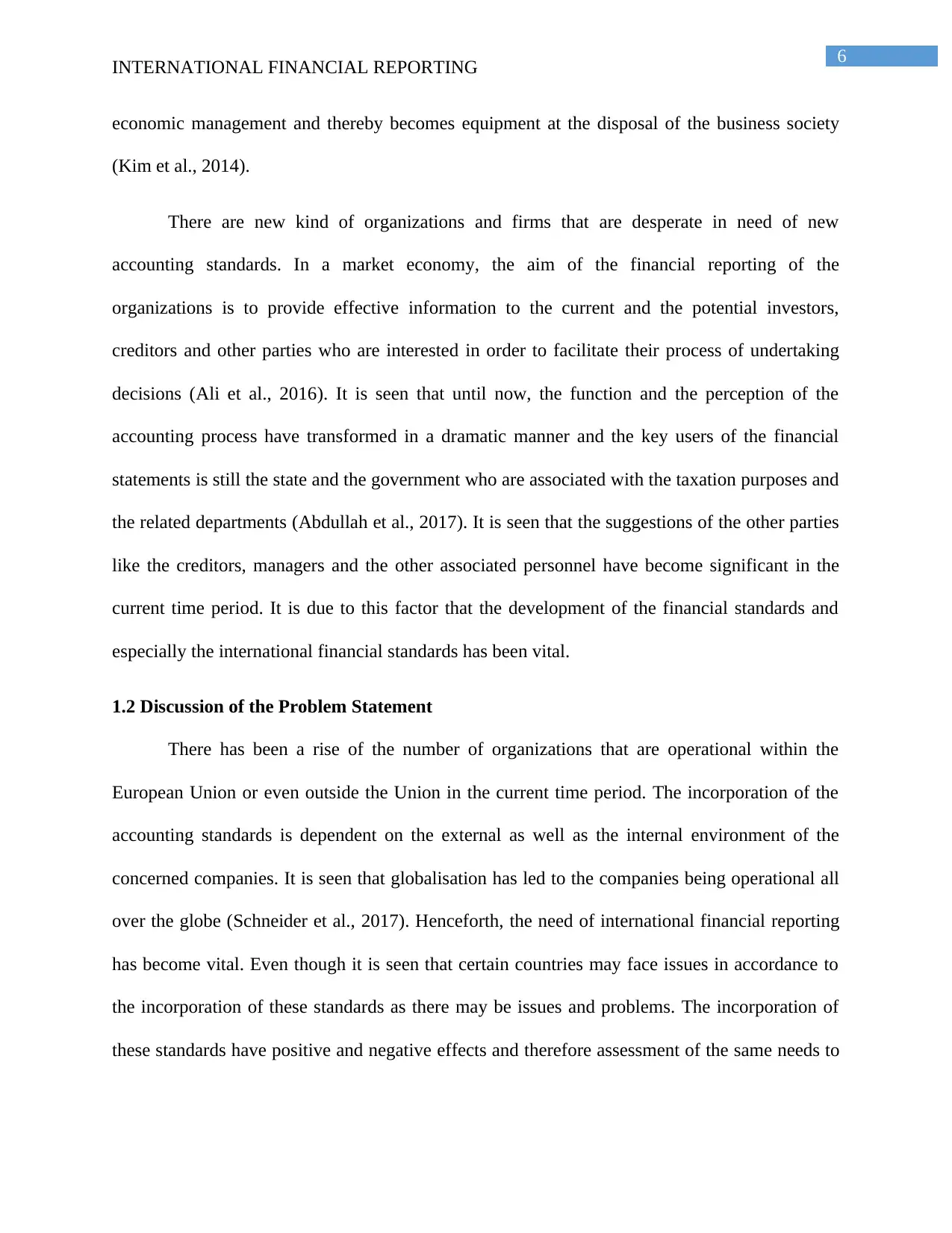
6
INTERNATIONAL FINANCIAL REPORTING
economic management and thereby becomes equipment at the disposal of the business society
(Kim et al., 2014).
There are new kind of organizations and firms that are desperate in need of new
accounting standards. In a market economy, the aim of the financial reporting of the
organizations is to provide effective information to the current and the potential investors,
creditors and other parties who are interested in order to facilitate their process of undertaking
decisions (Ali et al., 2016). It is seen that until now, the function and the perception of the
accounting process have transformed in a dramatic manner and the key users of the financial
statements is still the state and the government who are associated with the taxation purposes and
the related departments (Abdullah et al., 2017). It is seen that the suggestions of the other parties
like the creditors, managers and the other associated personnel have become significant in the
current time period. It is due to this factor that the development of the financial standards and
especially the international financial standards has been vital.
1.2 Discussion of the Problem Statement
There has been a rise of the number of organizations that are operational within the
European Union or even outside the Union in the current time period. The incorporation of the
accounting standards is dependent on the external as well as the internal environment of the
concerned companies. It is seen that globalisation has led to the companies being operational all
over the globe (Schneider et al., 2017). Henceforth, the need of international financial reporting
has become vital. Even though it is seen that certain countries may face issues in accordance to
the incorporation of these standards as there may be issues and problems. The incorporation of
these standards have positive and negative effects and therefore assessment of the same needs to
INTERNATIONAL FINANCIAL REPORTING
economic management and thereby becomes equipment at the disposal of the business society
(Kim et al., 2014).
There are new kind of organizations and firms that are desperate in need of new
accounting standards. In a market economy, the aim of the financial reporting of the
organizations is to provide effective information to the current and the potential investors,
creditors and other parties who are interested in order to facilitate their process of undertaking
decisions (Ali et al., 2016). It is seen that until now, the function and the perception of the
accounting process have transformed in a dramatic manner and the key users of the financial
statements is still the state and the government who are associated with the taxation purposes and
the related departments (Abdullah et al., 2017). It is seen that the suggestions of the other parties
like the creditors, managers and the other associated personnel have become significant in the
current time period. It is due to this factor that the development of the financial standards and
especially the international financial standards has been vital.
1.2 Discussion of the Problem Statement
There has been a rise of the number of organizations that are operational within the
European Union or even outside the Union in the current time period. The incorporation of the
accounting standards is dependent on the external as well as the internal environment of the
concerned companies. It is seen that globalisation has led to the companies being operational all
over the globe (Schneider et al., 2017). Henceforth, the need of international financial reporting
has become vital. Even though it is seen that certain countries may face issues in accordance to
the incorporation of these standards as there may be issues and problems. The incorporation of
these standards have positive and negative effects and therefore assessment of the same needs to
Paraphrase This Document
Need a fresh take? Get an instant paraphrase of this document with our AI Paraphraser
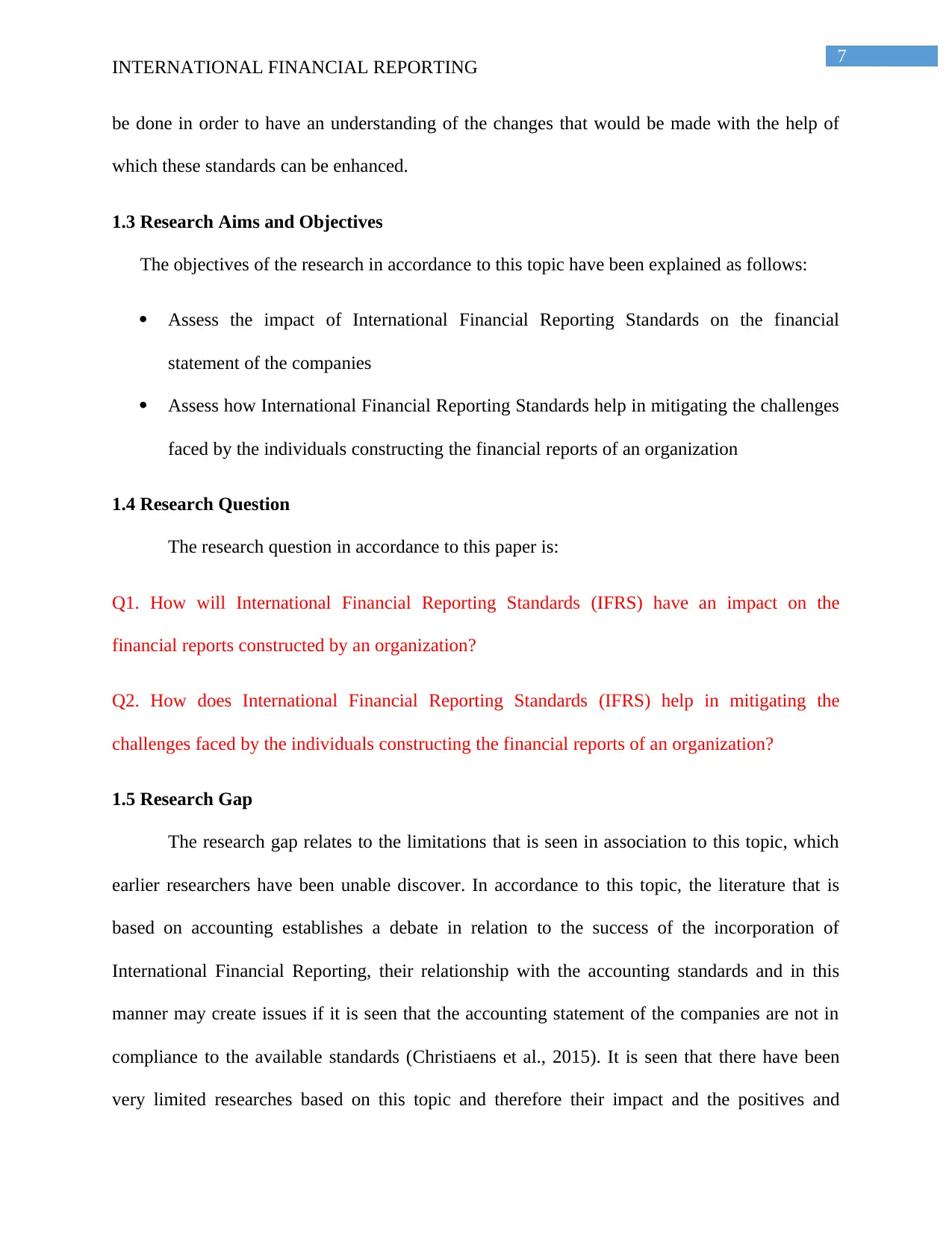
7
INTERNATIONAL FINANCIAL REPORTING
be done in order to have an understanding of the changes that would be made with the help of
which these standards can be enhanced.
1.3 Research Aims and Objectives
The objectives of the research in accordance to this topic have been explained as follows:
Assess the impact of International Financial Reporting Standards on the financial
statement of the companies
Assess how International Financial Reporting Standards help in mitigating the challenges
faced by the individuals constructing the financial reports of an organization
1.4 Research Question
The research question in accordance to this paper is:
Q1. How will International Financial Reporting Standards (IFRS) have an impact on the
financial reports constructed by an organization?
Q2. How does International Financial Reporting Standards (IFRS) help in mitigating the
challenges faced by the individuals constructing the financial reports of an organization?
1.5 Research Gap
The research gap relates to the limitations that is seen in association to this topic, which
earlier researchers have been unable discover. In accordance to this topic, the literature that is
based on accounting establishes a debate in relation to the success of the incorporation of
International Financial Reporting, their relationship with the accounting standards and in this
manner may create issues if it is seen that the accounting statement of the companies are not in
compliance to the available standards (Christiaens et al., 2015). It is seen that there have been
very limited researches based on this topic and therefore their impact and the positives and
INTERNATIONAL FINANCIAL REPORTING
be done in order to have an understanding of the changes that would be made with the help of
which these standards can be enhanced.
1.3 Research Aims and Objectives
The objectives of the research in accordance to this topic have been explained as follows:
Assess the impact of International Financial Reporting Standards on the financial
statement of the companies
Assess how International Financial Reporting Standards help in mitigating the challenges
faced by the individuals constructing the financial reports of an organization
1.4 Research Question
The research question in accordance to this paper is:
Q1. How will International Financial Reporting Standards (IFRS) have an impact on the
financial reports constructed by an organization?
Q2. How does International Financial Reporting Standards (IFRS) help in mitigating the
challenges faced by the individuals constructing the financial reports of an organization?
1.5 Research Gap
The research gap relates to the limitations that is seen in association to this topic, which
earlier researchers have been unable discover. In accordance to this topic, the literature that is
based on accounting establishes a debate in relation to the success of the incorporation of
International Financial Reporting, their relationship with the accounting standards and in this
manner may create issues if it is seen that the accounting statement of the companies are not in
compliance to the available standards (Christiaens et al., 2015). It is seen that there have been
very limited researches based on this topic and therefore their impact and the positives and
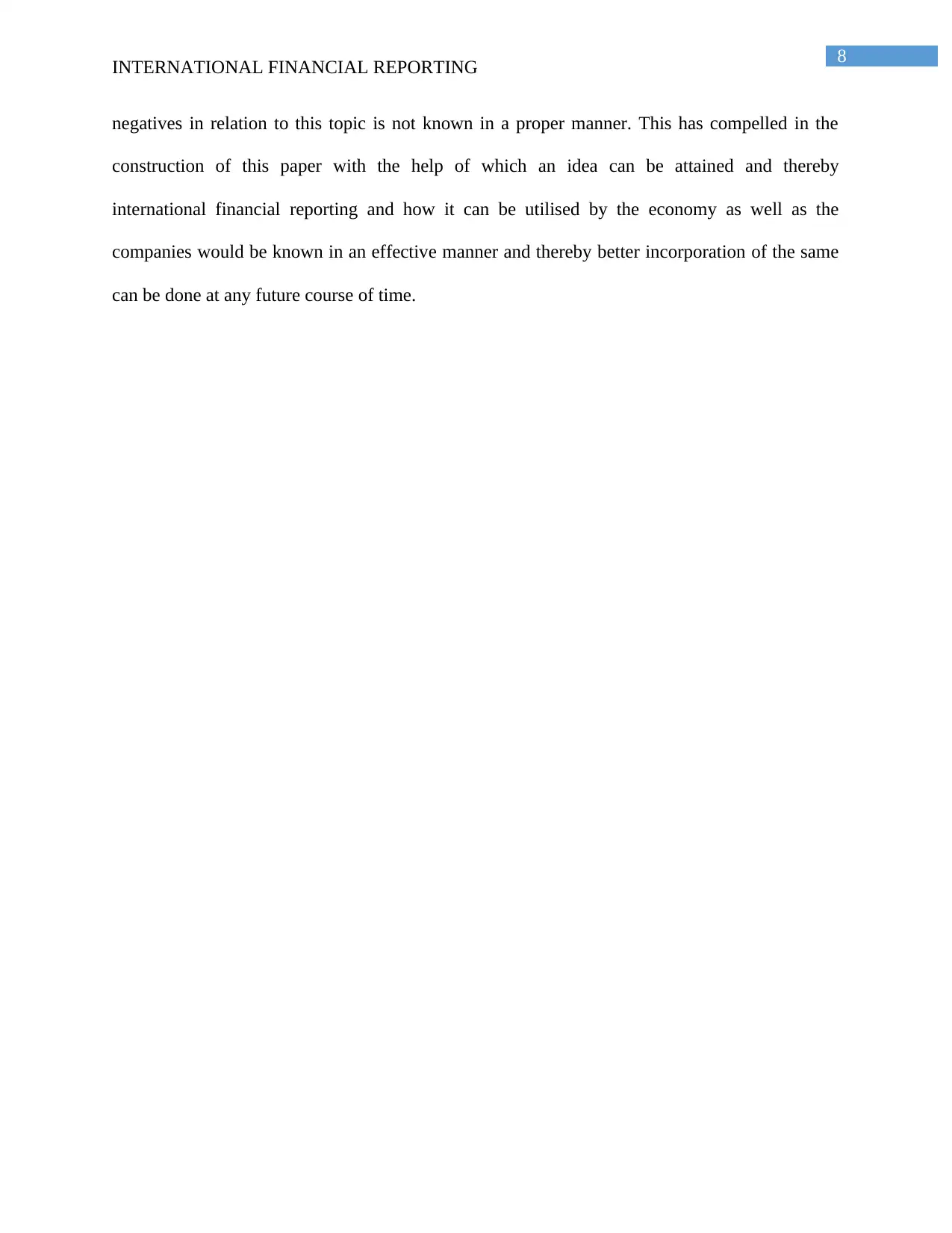
8
INTERNATIONAL FINANCIAL REPORTING
negatives in relation to this topic is not known in a proper manner. This has compelled in the
construction of this paper with the help of which an idea can be attained and thereby
international financial reporting and how it can be utilised by the economy as well as the
companies would be known in an effective manner and thereby better incorporation of the same
can be done at any future course of time.
INTERNATIONAL FINANCIAL REPORTING
negatives in relation to this topic is not known in a proper manner. This has compelled in the
construction of this paper with the help of which an idea can be attained and thereby
international financial reporting and how it can be utilised by the economy as well as the
companies would be known in an effective manner and thereby better incorporation of the same
can be done at any future course of time.
⊘ This is a preview!⊘
Do you want full access?
Subscribe today to unlock all pages.

Trusted by 1+ million students worldwide
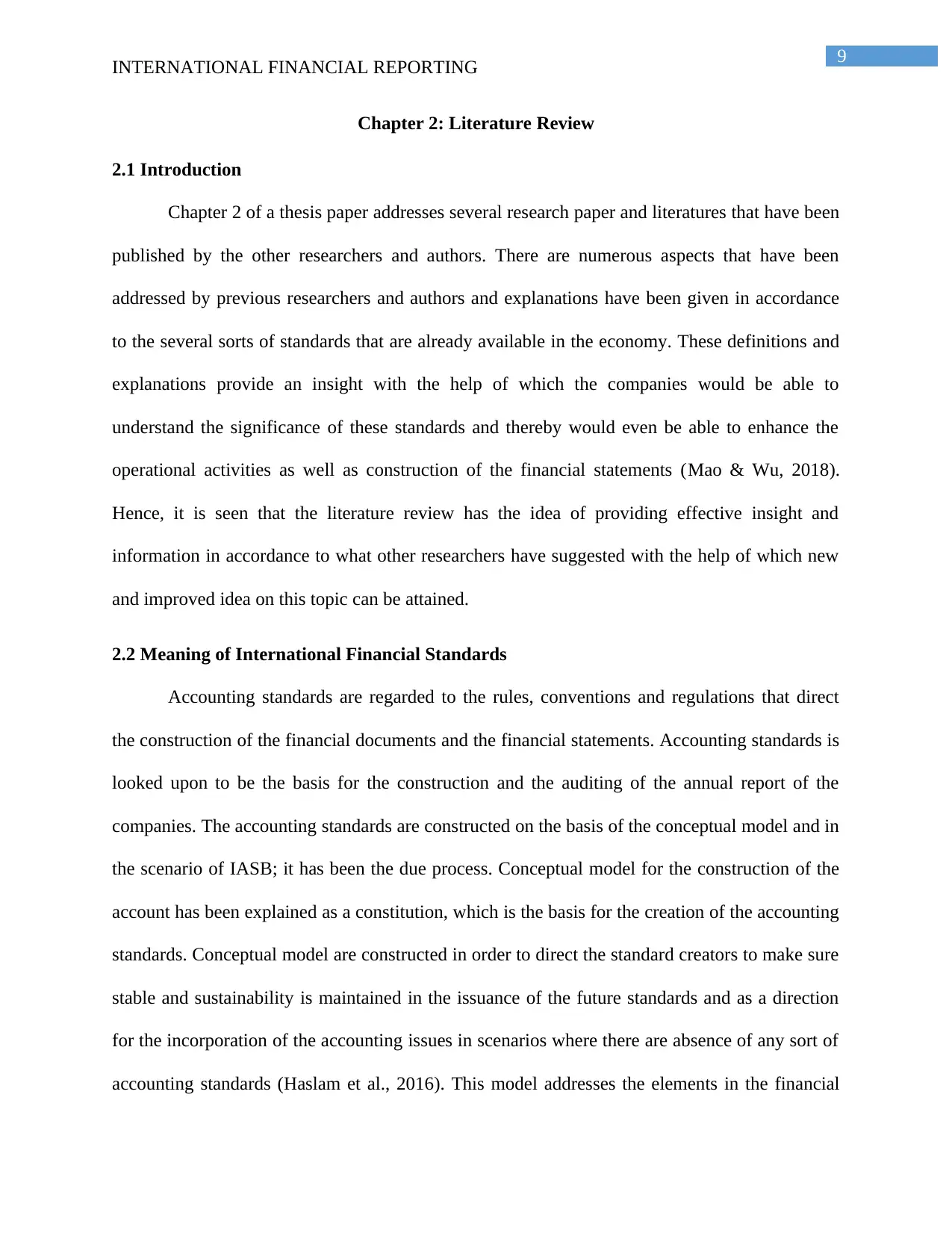
9
INTERNATIONAL FINANCIAL REPORTING
Chapter 2: Literature Review
2.1 Introduction
Chapter 2 of a thesis paper addresses several research paper and literatures that have been
published by the other researchers and authors. There are numerous aspects that have been
addressed by previous researchers and authors and explanations have been given in accordance
to the several sorts of standards that are already available in the economy. These definitions and
explanations provide an insight with the help of which the companies would be able to
understand the significance of these standards and thereby would even be able to enhance the
operational activities as well as construction of the financial statements (Mao & Wu, 2018).
Hence, it is seen that the literature review has the idea of providing effective insight and
information in accordance to what other researchers have suggested with the help of which new
and improved idea on this topic can be attained.
2.2 Meaning of International Financial Standards
Accounting standards are regarded to the rules, conventions and regulations that direct
the construction of the financial documents and the financial statements. Accounting standards is
looked upon to be the basis for the construction and the auditing of the annual report of the
companies. The accounting standards are constructed on the basis of the conceptual model and in
the scenario of IASB; it has been the due process. Conceptual model for the construction of the
account has been explained as a constitution, which is the basis for the creation of the accounting
standards. Conceptual model are constructed in order to direct the standard creators to make sure
stable and sustainability is maintained in the issuance of the future standards and as a direction
for the incorporation of the accounting issues in scenarios where there are absence of any sort of
accounting standards (Haslam et al., 2016). This model addresses the elements in the financial
INTERNATIONAL FINANCIAL REPORTING
Chapter 2: Literature Review
2.1 Introduction
Chapter 2 of a thesis paper addresses several research paper and literatures that have been
published by the other researchers and authors. There are numerous aspects that have been
addressed by previous researchers and authors and explanations have been given in accordance
to the several sorts of standards that are already available in the economy. These definitions and
explanations provide an insight with the help of which the companies would be able to
understand the significance of these standards and thereby would even be able to enhance the
operational activities as well as construction of the financial statements (Mao & Wu, 2018).
Hence, it is seen that the literature review has the idea of providing effective insight and
information in accordance to what other researchers have suggested with the help of which new
and improved idea on this topic can be attained.
2.2 Meaning of International Financial Standards
Accounting standards are regarded to the rules, conventions and regulations that direct
the construction of the financial documents and the financial statements. Accounting standards is
looked upon to be the basis for the construction and the auditing of the annual report of the
companies. The accounting standards are constructed on the basis of the conceptual model and in
the scenario of IASB; it has been the due process. Conceptual model for the construction of the
account has been explained as a constitution, which is the basis for the creation of the accounting
standards. Conceptual model are constructed in order to direct the standard creators to make sure
stable and sustainability is maintained in the issuance of the future standards and as a direction
for the incorporation of the accounting issues in scenarios where there are absence of any sort of
accounting standards (Haslam et al., 2016). This model addresses the elements in the financial
Paraphrase This Document
Need a fresh take? Get an instant paraphrase of this document with our AI Paraphraser
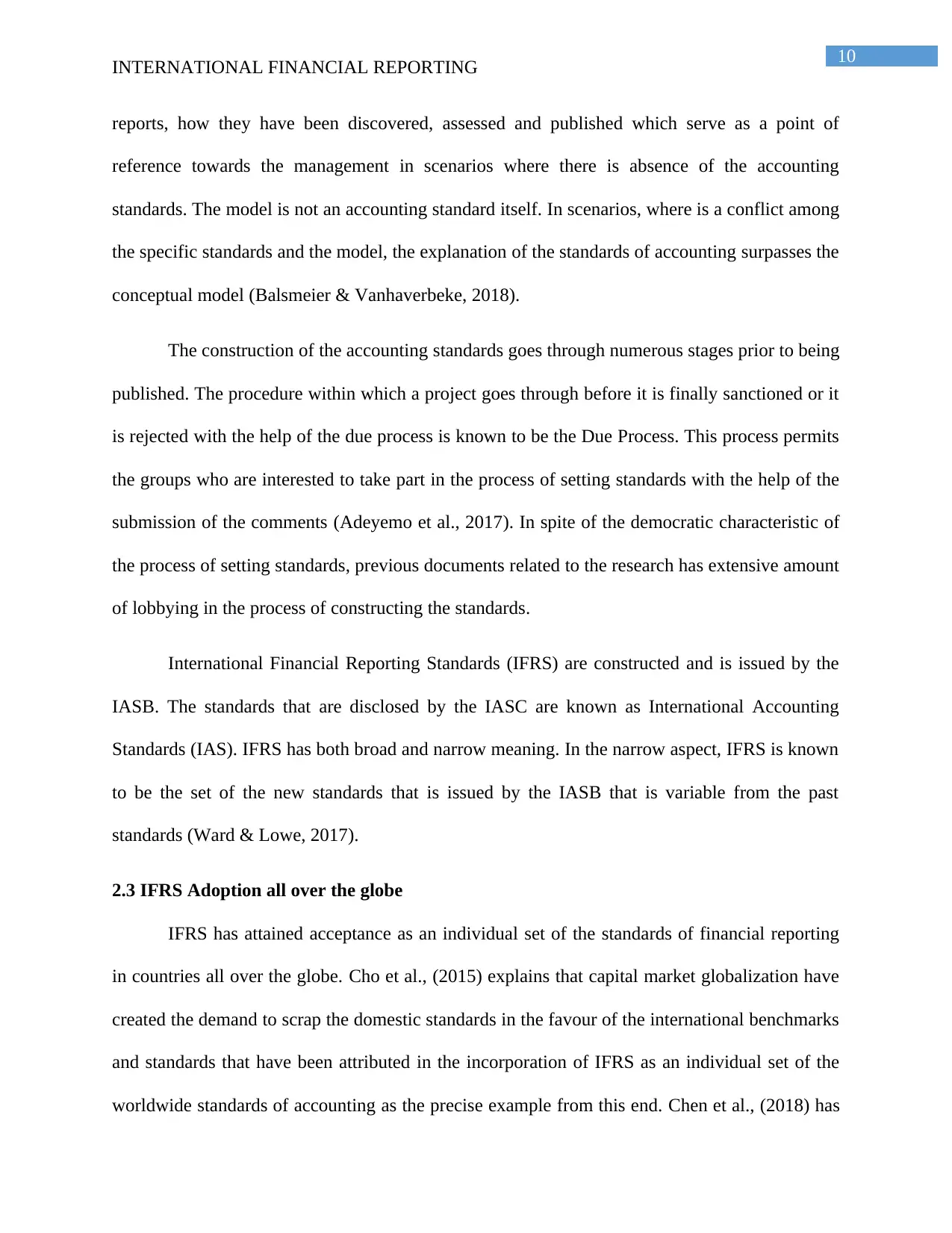
10
INTERNATIONAL FINANCIAL REPORTING
reports, how they have been discovered, assessed and published which serve as a point of
reference towards the management in scenarios where there is absence of the accounting
standards. The model is not an accounting standard itself. In scenarios, where is a conflict among
the specific standards and the model, the explanation of the standards of accounting surpasses the
conceptual model (Balsmeier & Vanhaverbeke, 2018).
The construction of the accounting standards goes through numerous stages prior to being
published. The procedure within which a project goes through before it is finally sanctioned or it
is rejected with the help of the due process is known to be the Due Process. This process permits
the groups who are interested to take part in the process of setting standards with the help of the
submission of the comments (Adeyemo et al., 2017). In spite of the democratic characteristic of
the process of setting standards, previous documents related to the research has extensive amount
of lobbying in the process of constructing the standards.
International Financial Reporting Standards (IFRS) are constructed and is issued by the
IASB. The standards that are disclosed by the IASC are known as International Accounting
Standards (IAS). IFRS has both broad and narrow meaning. In the narrow aspect, IFRS is known
to be the set of the new standards that is issued by the IASB that is variable from the past
standards (Ward & Lowe, 2017).
2.3 IFRS Adoption all over the globe
IFRS has attained acceptance as an individual set of the standards of financial reporting
in countries all over the globe. Cho et al., (2015) explains that capital market globalization have
created the demand to scrap the domestic standards in the favour of the international benchmarks
and standards that have been attributed in the incorporation of IFRS as an individual set of the
worldwide standards of accounting as the precise example from this end. Chen et al., (2018) has
INTERNATIONAL FINANCIAL REPORTING
reports, how they have been discovered, assessed and published which serve as a point of
reference towards the management in scenarios where there is absence of the accounting
standards. The model is not an accounting standard itself. In scenarios, where is a conflict among
the specific standards and the model, the explanation of the standards of accounting surpasses the
conceptual model (Balsmeier & Vanhaverbeke, 2018).
The construction of the accounting standards goes through numerous stages prior to being
published. The procedure within which a project goes through before it is finally sanctioned or it
is rejected with the help of the due process is known to be the Due Process. This process permits
the groups who are interested to take part in the process of setting standards with the help of the
submission of the comments (Adeyemo et al., 2017). In spite of the democratic characteristic of
the process of setting standards, previous documents related to the research has extensive amount
of lobbying in the process of constructing the standards.
International Financial Reporting Standards (IFRS) are constructed and is issued by the
IASB. The standards that are disclosed by the IASC are known as International Accounting
Standards (IAS). IFRS has both broad and narrow meaning. In the narrow aspect, IFRS is known
to be the set of the new standards that is issued by the IASB that is variable from the past
standards (Ward & Lowe, 2017).
2.3 IFRS Adoption all over the globe
IFRS has attained acceptance as an individual set of the standards of financial reporting
in countries all over the globe. Cho et al., (2015) explains that capital market globalization have
created the demand to scrap the domestic standards in the favour of the international benchmarks
and standards that have been attributed in the incorporation of IFRS as an individual set of the
worldwide standards of accounting as the precise example from this end. Chen et al., (2018) has
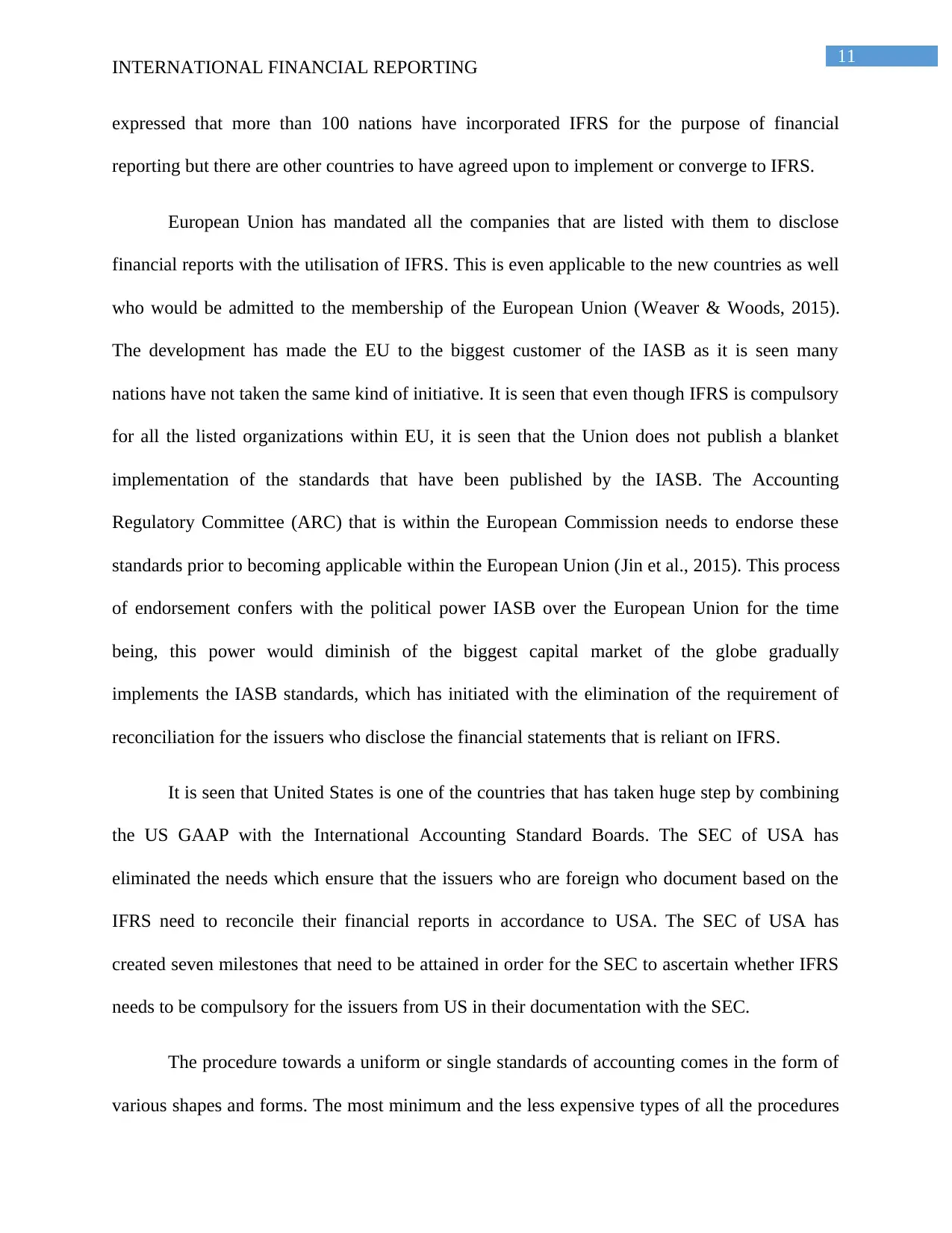
11
INTERNATIONAL FINANCIAL REPORTING
expressed that more than 100 nations have incorporated IFRS for the purpose of financial
reporting but there are other countries to have agreed upon to implement or converge to IFRS.
European Union has mandated all the companies that are listed with them to disclose
financial reports with the utilisation of IFRS. This is even applicable to the new countries as well
who would be admitted to the membership of the European Union (Weaver & Woods, 2015).
The development has made the EU to the biggest customer of the IASB as it is seen many
nations have not taken the same kind of initiative. It is seen that even though IFRS is compulsory
for all the listed organizations within EU, it is seen that the Union does not publish a blanket
implementation of the standards that have been published by the IASB. The Accounting
Regulatory Committee (ARC) that is within the European Commission needs to endorse these
standards prior to becoming applicable within the European Union (Jin et al., 2015). This process
of endorsement confers with the political power IASB over the European Union for the time
being, this power would diminish of the biggest capital market of the globe gradually
implements the IASB standards, which has initiated with the elimination of the requirement of
reconciliation for the issuers who disclose the financial statements that is reliant on IFRS.
It is seen that United States is one of the countries that has taken huge step by combining
the US GAAP with the International Accounting Standard Boards. The SEC of USA has
eliminated the needs which ensure that the issuers who are foreign who document based on the
IFRS need to reconcile their financial reports in accordance to USA. The SEC of USA has
created seven milestones that need to be attained in order for the SEC to ascertain whether IFRS
needs to be compulsory for the issuers from US in their documentation with the SEC.
The procedure towards a uniform or single standards of accounting comes in the form of
various shapes and forms. The most minimum and the less expensive types of all the procedures
INTERNATIONAL FINANCIAL REPORTING
expressed that more than 100 nations have incorporated IFRS for the purpose of financial
reporting but there are other countries to have agreed upon to implement or converge to IFRS.
European Union has mandated all the companies that are listed with them to disclose
financial reports with the utilisation of IFRS. This is even applicable to the new countries as well
who would be admitted to the membership of the European Union (Weaver & Woods, 2015).
The development has made the EU to the biggest customer of the IASB as it is seen many
nations have not taken the same kind of initiative. It is seen that even though IFRS is compulsory
for all the listed organizations within EU, it is seen that the Union does not publish a blanket
implementation of the standards that have been published by the IASB. The Accounting
Regulatory Committee (ARC) that is within the European Commission needs to endorse these
standards prior to becoming applicable within the European Union (Jin et al., 2015). This process
of endorsement confers with the political power IASB over the European Union for the time
being, this power would diminish of the biggest capital market of the globe gradually
implements the IASB standards, which has initiated with the elimination of the requirement of
reconciliation for the issuers who disclose the financial statements that is reliant on IFRS.
It is seen that United States is one of the countries that has taken huge step by combining
the US GAAP with the International Accounting Standard Boards. The SEC of USA has
eliminated the needs which ensure that the issuers who are foreign who document based on the
IFRS need to reconcile their financial reports in accordance to USA. The SEC of USA has
created seven milestones that need to be attained in order for the SEC to ascertain whether IFRS
needs to be compulsory for the issuers from US in their documentation with the SEC.
The procedure towards a uniform or single standards of accounting comes in the form of
various shapes and forms. The most minimum and the less expensive types of all the procedures
⊘ This is a preview!⊘
Do you want full access?
Subscribe today to unlock all pages.

Trusted by 1+ million students worldwide
1 out of 42
Related Documents
Your All-in-One AI-Powered Toolkit for Academic Success.
+13062052269
info@desklib.com
Available 24*7 on WhatsApp / Email
![[object Object]](/_next/static/media/star-bottom.7253800d.svg)
Unlock your academic potential
Copyright © 2020–2025 A2Z Services. All Rights Reserved. Developed and managed by ZUCOL.





